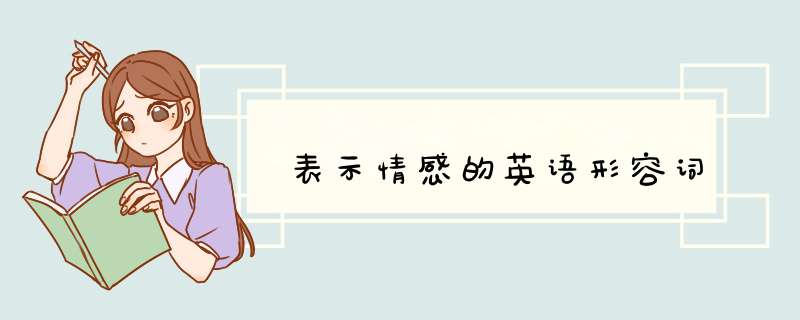
悲伤sad sorrowful
高兴lively 、 cheerful and light-hearted、 in a merry mood、happy、joyful 、joyous
兴奋delightful、exciting、be excited、hectic、excitement、epsia、elated
郁闷gloomy、depressed
生气get angry、take offence、in a rage、irritate、pissed off
伤心
heart-struck 伤心的
smart from 伤心
忧伤
dolorous 忧伤的
grief-stricken 极度忧伤的
烦恼
agonise 烦恼
agonising 烦恼的
agonisingly 烦恼地
agonizingly 使人烦恼地
annoyance 烦恼
bother about 烦恼
cark 烦恼
disencumber 摆脱烦恼
fash 烦恼
fret away 烦恼中度过
fret 烦恼
galling 使烦恼的
harass 烦恼
overcare 自寻烦恼
shuffle off this mortal coil 摆脱尘世烦恼
Sufficient for the day is the evil thereof 当时的烦恼就够多了
teasingly 烦恼地
trouble 烦恼
untroubled 无烦恼的
vex oneself 独自烦恼
vex 使烦恼
vexation 烦恼
worriless 无烦恼的
worrisome 令人烦恼的
worrit 烦恼
worry oneself 自找烦恼
worry 烦恼
worrywart 自寻烦恼者
忧伤
desolation mourn take no thought for 忧伤
mirthlessly 忧伤地
开心
have fun 玩得开心
jollier 讨人开心者
yippee 开心
伤感
slop over 伤感
part friends 不伤感情地分手
sentimentalize 伤感
尴尬
awkard embarrassed discomfiture 尴尬
up a stump 处境尴尬
恼怒
exasperation 恼怒
get the needle 恼怒
irritated 恼怒的
生气
angry 生气的
as cross as two sticks 非常生气的
as mad as a wet hen 非常生气
huffish 生气的
riley 生气的
snuffy 生气的
sulky 生气的
幸福
beatific 幸福的
benedictional 使人幸福的
blessedly 幸福地
blessedness 幸福
blissfully 幸福地
days marked with a white stone 幸福的日子
eudemonia 幸福
eudemonic 幸福的
felicific 幸福的
felicity 幸福
happily 幸福地
happiness 幸福
on top of the world 幸福到极点
高兴
bobbish 高兴的
cheerfully 高高兴兴地
cheerfulness 高兴
chuffed 高兴的
delectate 使高兴
disgruntle 使不高兴
exhilarate 使高兴
exhilaration 令人高兴
exhilarative 使高兴的
exult 非常高兴
exultant 非常高兴的
glad at 高兴
glad of 高兴
glad to meet you 很高兴认识你
glad 高兴的
gladly 高兴地
gladsome 高兴的
gleesome 极为高兴的
good humor 高兴
grouch 不高兴的人
grouchily 不高兴地
grouchy 不高兴的
hilarity 高兴
ill humor 不高兴
jauntily 高兴地
jauntiness 高兴
jollity 高兴
joyancy 高兴
joyless 不高兴的
nice to meet you 很高兴见到你
out of sorts 不高兴的
pleased 高兴的
rejoicingly 高兴地
sulkiness 不高兴
sullenly 不高兴地
harrowing 痛心的
孤独
lone 孤独的
loneliness 孤独
lonely 孤独的
loner 孤独的人
monophobia 孤独恐惧症
plough a lonely furrow 孤独地行动
solitary 孤独的
solitude 孤独
疲倦
aweary 疲倦的
beat-out 疲倦不堪的
careworn 疲倦的
dog-tired 疲倦极的
forspent 疲倦的
forwearied 极疲倦的
forworn 极疲倦的
get tired 疲倦
got tired 疲倦
harassed 疲倦的
indefatigable 不知疲倦的
languid 疲倦的
languidly 疲倦地
languorously 疲倦地
poohed 疲倦的
tireless 不疲倦的
tirelessly 不知疲倦地
untiringly 不疲倦地
unwearied 不疲倦的
wearily 疲倦地
weariness 疲倦
wearisome 使疲倦的
weary 疲倦的
讨厌
a wet smack 讨厌的人
abominable 讨厌的
accursed 讨厌的
accurst 讨厌的
antipathetic 讨厌的
bally 讨厌的
betenoire 讨厌的人
blighter 讨厌的家伙
bore 讨厌的人
brattish 讨厌的
bratty 讨厌的
cumbersome 讨厌的
cumbrous 讨厌的
disfavour 讨厌
disgustingly 讨厌地
dislike 讨厌
disrelish 讨厌
distaste 讨厌
flipping 讨厌之极的
icky 讨厌的
irksome 讨厌的
loathing 讨厌
loathsome 讨厌的
loathsomely 令人讨厌地
nuisance 讨厌的
objectionable 讨厌的
odiously 讨厌地
odiousness 讨厌
odium 讨厌
offensive 讨厌的
pesky 讨厌的
plaguy 讨厌的
rebarbative 令人讨厌的
sad apple 讨厌的家伙
skunk 讨厌鬼
snorty 令人讨厌的
sourpuss 讨厌鬼
stinking 非常讨厌的
vilely 讨厌地
vileness 讨厌
wet smack 讨厌的人
喜欢
get down on 开始不喜欢
grow upon 逐渐喜欢
have a liking for 喜欢
have a mark on 喜欢
have a sweet teeth 喜欢吃甜
have a sweet tooth 喜欢吃甜
homekeeping 不喜欢外出的
inhabitiveness 喜欢待在同一住所
liked 喜欢
likesome 讨人喜欢的
neophilia 喜欢新奇
out of conceit with 不再喜欢
persona grata 讨人喜欢的人
prefer 更喜欢
take a fancy to 喜欢
take a liking for 喜欢
take a pleasure in 喜欢
take shine to 喜欢
yappy 喜欢叫嚷的
absolutely!-绝对正确
adorable!-可爱极了
amazing!-太神了
anytime!-随时吩咐
almost!-差不多了
awful!-好可怕啊
after u-您先
about when-大约何时
all set-一切妥当
allow me!-让我来
baloney!-胡扯!荒谬
behave!-放尊重点
bingo!-中了
boring!-真无聊
brovo!-太棒了
bullshit!-胡说
crazy!-疯了
deal!-一言为定
disgusting!-好恶心呀
drat!-讨厌
Encore!-再来一次!
Exactly!-完全正确!
Fantastic!-妙极了!
Farewell!-再见!
Fifty-fifty!-对半分!
Foul!-犯规了!
Fresh!-好有型!
Gesundheit!-保重!(特别用于对打喷嚏的人说)
Gone!-跑了!
Gorgeous!-美极了!
Hopefully!-希望如此!
Horrible!-好可怕!
Hot!-好辣!
Hurrah!-万岁!
Hush!-(肃静)嘘!
Incredible!-不可思议!
Indeed-真的?
Liar!-你撒谎!
Lousy!-差劲!
Marverllous!-棒极了!
Outrageous!-不得了!
Please!-拜托了!
Probably!-很可能!
Present!-到(有)!(用于点名时)
Relax!-放轻松!
Rats!-差劲!
Speaking!-(打电话时)我就是!
Still-仍是这样?
Someday!-改天吧!
So so!-马马虎虎!
Satisfied-满意吗?
Stingy!-小气鬼!
Superb!-棒极了!
Surprise!-给你一个惊喜!
Terrible!-好可怕!
Thirsty-渴吗!
Toast!-干杯!
Unbelievable!-难以置信!
Unisex-男女通用的?
Willingly!-很乐意!
这里有大量经典英文小说,包括许多著名的爱情故事。里面表达感情的词汇也应有尽有。
英语图书网:海量免费英文经典读物,提高英语新捷径
http://wwwenglish-booksnet/
参考资料:
英语中有一类表示 “情感” 的动词,它们有以下共同的特征:(以 interest 为例)
1 汉语意思是 “使人” , 一般只跟表示人的代词或名词作宾语 inerest “使人感兴趣” 如:The story interests us students 这个故事使我们学生很感兴趣。
2 由这类动词所构成的 -ed 形容词, 汉语意思是 “(人自己)感到的” 如:The students are inerested in the story 学生们对这个故事感兴趣。
3 由这类动词所构成的 -ing 形容词, 汉语意思是 “令人的” 如: The story is very interesting 这个故事很有趣(令人感兴趣)。
下面我们总结一下这类动词,它们的用法都与interest 相类似:alarm 使惊吓, amaze 使惊奇, amuse 使发笑, annoy 使生气, astonish 使吃惊, ashame 使害羞, affect 使伤感, bore 使乏味, convince 使信服, charm 使欣喜, distress 使悲伤, disturb 使烦恼, delight 使高兴, disappoint 使失望, discourage 使泄气, disgust 使恶心, displease 使恼怒, dismay 使气馁, distract 使分神, depress 使忧愁, excit 使兴奋, encourage 使受鼓励, embarrass 使尴尬, frighten 使害怕, frustrate 使沮丧, fascinat 使着迷 , gratify 使满意, interest 使感兴趣, inspire 使受鼓舞, move 使感动, please 使愉悦, puzzle 使迷惑, perplex 使困惑, reassure 使放心, surprise 使惊讶, satisfy 使满足, shock 使震惊, tire 使疲倦, touch 使怜悯 , 使感动, trouble 使忧虑 , worry 使担心, confuse 使迷惑。
下面让我们一起来分析一下由这些动词构成的 -ing 和 -ed 形容词在句子中的用法究竟有什么区别:
I 这类形容词可以做表语:说明句子主语的性质,特点或所处状态。其中 -ed 只用于说明主语是表示“人” 的名词或代词,汉语意思是 “(人自己)感到的” ,且与主语是被动关系。而 -ing可用于说明主语是表示“事物或人”的名词或代词。汉语意思是 “令人的” ,且与主语是主动关系。
如:The students are confused (about the problem) 学生们(对那道题)感到迷惑不解。(主语自己感到迷惑不解,与原动词confuse 是被动关系)
The problem is confusing 那道题令人迷惑不解。He is confuseing 他令人迷惑不解。(指他的言行让别的人迷惑不解。) 这两个句子中的主语: the propblem 和 he 与原动词 confuse 是主动关系。
II 这类形容词可以做定语修饰名词,说明该名词的性质,特点或所处状态。其中 -ed 只用于修饰表示“人” 的名词,汉语意思是 “(人自己)感到的” ,且与该名词是被动关系。而 -ing可用于修饰表示“事物或人”的名词。汉语意思是 “令人的” ,且与该名词是主动关系。
如: Theexcitedcrowd are shouting with joy 激动的人群在欢呼着。excited 修饰 crowd, 且与crowd 是被动关系。
This is exciting news 这是令人激动的消息。// He is a very interesting man 他是一个很有趣的人。(指此人的言行让别人感兴趣。)两句中的 -ing 形容词 exciting 和 interesting 都与所修饰的名词 news 和 man 有主动关系。
注:如果这类形容词做定语修饰由人发出的 “声音或表情” 的名词时,则要说明发出者的性质,特点或状态。 用-ed 表示发出者自己 “感到的” ,与发出者是被动关系。而用 -ing表示发出者 ”令别的人的“,与发出者是主动关系。
如:The tiger let out afrightening howl 老虎发出了令人恐惧的嗥叫声。(名词 howl 的发出者是 tiger。frightening是做定语修饰名词 howl,说明发出者tiger 令人恐惧,且与tiger是主动关系。)
There is a frightened look on her face 她的脸上流露出恐惧的表情。(名词 look 的发出者是 “她”。frightened是做定语修饰名词 look,说明发出者“她”自己感到恐惧,且与发出者“她”是被动关系。)
III 这类形容词可以做宾补:说明宾语的性质,特点或所处状态。其中 -ed 只用于说明宾语是表示“人” 的名词或代词,汉语意思是 “(人自己)感到的” ,且与宾语是被动关系。而 -ing可用于说明宾语是表示“事物或人”的名词或代词。汉语意思是 “令人的” ,且与宾语是主动关系。
如: We found the man disappointed 我们发现那个人很失望。(disappointed 做宾补,说明宾语 the man 自己感到很失望)
We found the job boring 我们发现这个工作令人乏味。 We found the lecturer boring 我们发现那位讲师令(别的)人乏味。(两句中 -ing 形容词 boring做宾补,说明宾语 the job 和 the lecturer令人乏味,与宾语主动关系。)
总结:-ing 和 -ed 形容词不论做什么成份,-ed 形容词只用于修饰说明 “人”;且与说明对象为被动关系。而 -ing 形容词既可修饰说明 “人” 也可修饰说明 “事物”。换言之:在解题中如果我们遇到要说明的名词是 “人”,则可能用 -ed 形容词(表示与被说明的 “人” 为被动关系,意思为此人自己 “感到的”);也可能用 -ing 形容词(表示与被说明的 “人” 为主动关系,意思为此人 “令别的人的”)。如果我们遇到要说明的名词是 “事物”,则只能用 -ing 形容词,且与要说明的 “事物” 是主动关系,意思为 “令人的”。
欢迎分享,转载请注明来源:浪漫分享网

 微信扫一扫
微信扫一扫
 支付宝扫一扫
支付宝扫一扫
评论列表(0条)